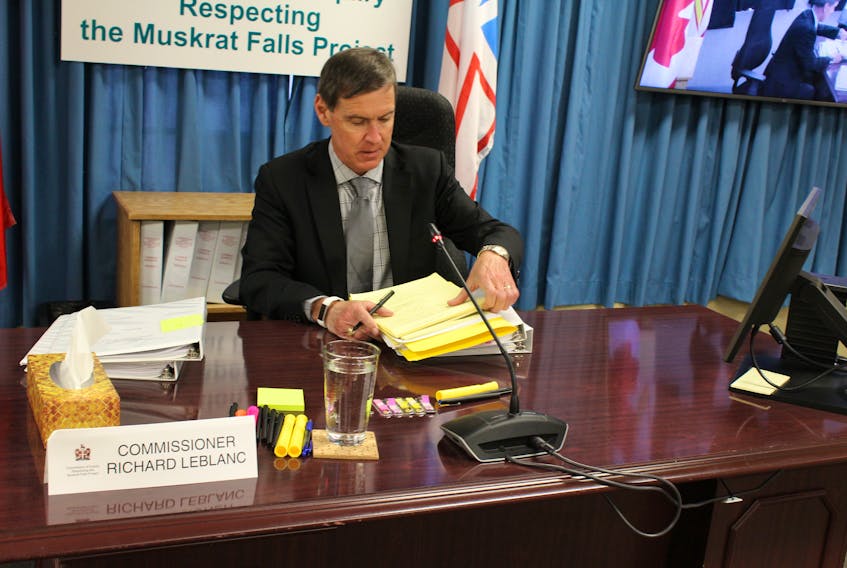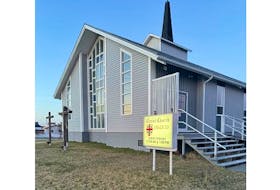Muskrat Falls Inquiry Commissioner Richard LeBlanc has issued a rebuke of Nalcor Energy’s claim of commercial sensitivity as a way to prevent information from going public.
In advance of a Grant Thornton audit that delves into the question of cost overruns once the Muskrat Falls project was sanctioned, Nalcor Energy submitted to the inquiry that certain aspects of the report be redacted in the interest of commercial sensitivity.
“I’m sure not everybody’s happy with this, and I can appreciate that. I’ve given this a great deal of thought over the last week or so,” LeBlanc told the inquiry on Tuesday.
In its original submission, Nalcor outlined three categories discussed in the report that it considers to be commercially sensitive: any forecasted costs for individual work packages before a contract award; the evaluation of bids, tenders and proposals; and any matter related to the main contract awarded to Astaldi Canada.
“I’m sure not everybody’s happy with this, and I can appreciate that. I’ve given this a great deal of thought over the last week or so." — Richard LeBlanc, Muskrat Falls Inquiry Commissioner
Perhaps the most sensitive issue is related to the Astaldi contract, as Astaldi and Nalcor Energy are currently embroiled in a lawsuit, in which Astaldi is claiming $500 million in damages.
Nalcor lawyer Dan Simmons raised concerns over disclosure of any matters relevant to the on-going litigation. Simmons said Nalcor was concerned that Astaldi could learn information from inquiry disclosure that could give the company an upper hand in the courts.
LeBlanc ruled against Nalcor in two of the three points raised in its submission.
On the matter of disclosing forecasted cost, LeBlanc agreed, to a point. LeBlanc says the inquiry will provide aggregate numbers of the value of existing contracts that are not yet completed.
For example, a table in the Grant Thornton report – which will be released ahead of the start of Phase 2 of the Inquiry – lists seven contracts that have gone over budget throughout the project. Instead of listing the exact value of the contracts and the amount each has gone over budget, an approximation will be used to give an idea of just how much more money was spent, without specifically disclosing commercial information.
Another factor at the heart of the discussion was the full Decision Gate 3 cost estimate for the project. LeBlanc ruled that all the cost estimates of the project’s pre-sanctioning will be publicly released.
LeBlanc also gave a blanket ruling that all information relating to the Astaldi contract will be publicly disclosed.
Nalcor had asked for the inquiry to essentially follow the lead of the courts: whatever was revealed in court could be revealed by the inquiry.
In his ruling, LeBlanc says he doesn’t see how it matters where information is made public in relation to that contract.
“Whether or not the disclosure occurs here first or there first, in my mind, does not cause me to conclude that there would be additional harm or financial harm to Nalcor Energy,” said LeBlanc.
“The risk of harm already exists by virtue of the events that have taken place.”
Consumer Advocate Dennis Browne says LeBlanc made a reasonable decision, balancing the needs of the public with the legitimate concerns about commercially sensitive information.

“The commissioner is ensuring public accountability for Nalcor and further ensuring that Nalcor cannot use the blanket of commercial sensitivity to stop the commission from doing its work,” Browne said.
LeBlanc’s ruling goes against how Nalcor tends to handle releasing information, Browne says.
“This became Nalcor’s view of the world: that nothing had to be disclosed. We saw some hints of that today in their application, in terms of trying to get some blanket immunity from disclosure by alleging commercial sensitivity,” he said.
“The judge certainly has shut down that concept of blanket immunity, under the guise of commercial sensitivity. We have gotten a long way from Bill 29 and the remnants of that, but still within Nalcor there is a culture of preferring not to disclose rather than to disclose.”
When it comes to what exactly is commercially sensitive information, LeBlanc says he was not provided any clear definition of the term to go by.
“When I started looking at commercial sensitivity, there was no ability on my part to find one kind of definition by consensus as to what is commercially sensitive information,” said LeBlanc.
“It’s generally understood to be information that has economic value or could cause economic harm.”
All information – including commercially sensitive information – will be available and reviewed by the inquiry. The matter on Tuesday dealt with what would be publicly disclosed by the inquiry.
The Muskrat Falls Inquiry will begin Phase 2 of its hearings on Feb. 17 in Happy Valley-Goose Bay.
Twitter: @DavidMaherNL
RELATED









